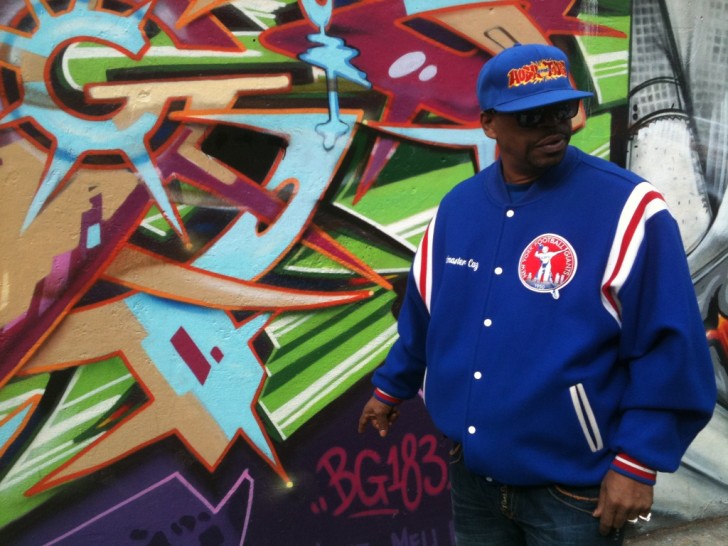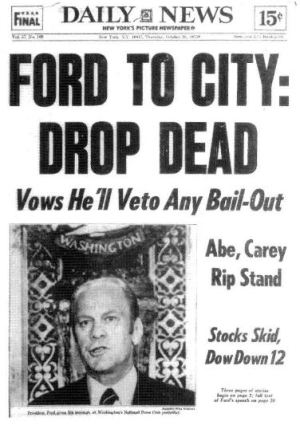On July 13th, 1977, lightning struck an electricity transmission line in New York City, causing the line’s automatic circuit breaker to kick in. The electricity from the affected line was diverted to another line. This was fairly normal and everything was fine—until a second bolt of lightning struck.
Electric lines started turning themselves off. As more and more lines failed, the whole system faltered. Eventually, the largest power generator in the area, known as Big Allis, shut down.
And then all of New York City went dark.

On that evening, DJ Grandmaster Caz, a Bronx native, and his DJ partner Disco Wiz were spinning records in a park. They had their sound system plugged into a lamppost. Caz recalls the evening: “The record just started slowing down, you know what I mean? So, quite naturally, we thought, it was us. We thought we had drained too much power and we shorted out the electricity. So we’re frantic, we’re looking around, we’re checking buttons, were checking switches, we’re seeing what’s up.”

But Caz and Wiz hadn’t shorted out the electricity. New York was in the middle of a city-wide blackout — with power failing in all five boroughs — and pretty soon, things started to get tense. As Caz recalls, “The stores started to close. Like the local bodegas on each corner — we would hear the gates slamming down. It was like they knew what was happening, they knew what was going on, they was like, ‘we closing up now.'”
In 1977, New York City was in dire financial straits. A couple of years prior, in 1975, the city had turned to the federal government for a bailout. President Gerald Ford’s response was a resounding “no,” prompting the New York Daily News to run the now-famous headline:

Ford never actually told New York to “drop dead,” but that’s how a lot of New Yorkers felt. And in the Bronx, people felt even more abandoned. Public programs had been cut, arson was rampant, and poverty was rife. The neighborhood was full of abandoned and burned-down buildings—just do a Google image search for “The Bronx 1970s.”
Joe Schloss, who researches hip hop culture at City University of New York said of the city in 1977, “It was like a powder keg. All it took was something to push it over the edge.”
New York had experienced blackouts before — there was a major outage in 1965 during which New Yorkers stayed mostly calm — but in 1977 the city experienced widespread looting.
“It was chaos that night,” says Grandmaster Caz. “And it was exciting afterwards. But while it was going on, it was scary.”
But Caz also believes that the 1977 blackout may have accelerated the growing hip hop movement, which was just beginning to put down roots in the Bronx. His theory: the looting that occurred during the blackout enabled people who couldn’t afford turntables and mixers to become DJs.
Caz says that he himself even stole new equipment that night. “I went right to the place where I bought my first set of DJ equipment, and I went and got me a mixer out of there.” He continues, “after the blackout, all this new wealth…was found by people and they just — opportunity sprang from that. And you could see the differences before the blackout and after.”
Caz’s theory — that the hip hop movement was catalyzed by the 1977 blackout — can’t really be confirmed. Joe Schloss, the hip hop researcher form City University buys it, with a caveat. “I think it’s true, but I think it’s also important to keep in mind that basically, hip hop history is an oral history at this point, and that it’s all mythology in some sense — the true stories as well as the false stories.”



Comments (10)
Share
Arson as a cause of fires in the Bronx has been very overstated. Joe Flood’s book “The Fires” has a lot of detailed information on other, more major, causes of the burning of the Bronx. Might be worth doing a show on that.
So hip hop is built on a foundation of theft and vandalism? Is that the message you were trying to send in this episode?
I don’t think that’s at all what they’re saying. Keep in mind the foundations had already been laid. The block parties, B-boys, etc. had already been evolving since the early 70’s. More than anything, this blackout could be argued to be (and they allude to it as) the catalyst that blasted hip-hop in to what it became in the 80’s and beyond.
I am a huge fan of 99pi, but like Chuck, this episode left me scratching my head. At least the tone – and tone matters – of the segment seemed to imply that the looting and vandalism allowed the artistry of hip hop artists and DJs to somehow spring forth. I don’t think that it’s cool to talk about these destructive CRIMINAL acts without at least acknowledging that they had devastating effects on communities at large, on the the livelihoods of individual merchants and their families, and in a time of crisis strained the scarce safety and medical resources. Maybe the next segment can be about be the artistry of a merchant praying that she has adequate casualty insurance?
Long time listener, first time commenter. There’s something different in this week’s podcast and I don’t think it’s necessarily about content, but about production quality. If feels like this podcast’s line of thought is not complete. The ending is to open to interpretation and I’m looking around to find the plaque to explain what I’m processing, but there’s nothing there. Because if this show has taught me anything, it’s to always read the plaque.
The ´tone´seems fine to me Ajoy. Did Hip Hop get created out of this one incident…no. It was already underway and its a collection of people, incidents, happenings, and points in time that allow a movement to spring forth. Besides, Graffiti (which was attached to hip hop in later years, and is now seen as the aesthetic of Hip hop) IS vandalism!! it is a criminal act, that is an essence of the movement.
When they set up in the park to play basketball and to rap battle they were tapping into a street lights power source illegally also.
Have you listened to some of the lyrics of rap today? its just criminal activity and the mis-treatment of women. it would be surprising if hip hop DIDNT have some historical illegal connection to it. but thats fine, it is what it is! Lets stop with the political correctness hindsight huh?
I can’t believe this entire episode did not contain the phrase “cascading failure.” The NYC blackout is often cited as a textbook example of this concept.
I’m with Trevor. This could have been a fascinating examination about the *design* of power networks. Remember design?
Yeah, sorry I can’t be sympathetic to looters and vandals. I don’t care how much money you spent in a store before looting it. You just robbed and destroyed the livelihood of a fellow community member.
When you say thomas edison you do of course mean Nicola Tesla, for it was he not the charlatan edison that’invented’ the grid. edison had absolutely nothing to do with the grid. in fact he fought tooth and nail to not adopt the grid, as his inferior DC system did not scale. he wanted a patchwork of islands.